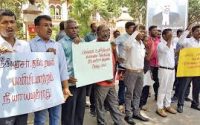Madras High Court summons Home Secretary.
Source – thehindu.com
The Madras High Court has summoned Home Secretary Niranjan Mardi to explain the delay in releasing five life convicts despite specific orders passed by a Division Bench of the court between December 7, 2018 and January 25 to release them forthwith by according the benefit of premature release granted to many other convicts in the State.
Justices M.M. Sundresh and RMT. Teekaa Raman said they had no choice but to issue statutory notices (requiring the presence of the Home Secretary in the court next month) in all the five contempt of court petitions filed against him since their patience had run thin after having granted enough time to release the convicts.
The judges had been granting time for the government to comply with the court orders ever since the contempt of court petitions were filed in July. In their last order, passed on November 21, they had said: “We do not wish to say anything more as there is a continuous pleading by the Additional Advocate General much to our embarrassment.
“Though our patience has run thin, we would like to extend our discretion one more time, despite strong opposition by the learned counsel appearing for the petitioners, for the sole reason that the learned AAG has stated that all the appeals (preferred before the Supreme Court against the Division Bench’s orders) are coming for hearing on Monday.”
However, when the contempt petitions were taken up on Wednesday, the government was not able to report whether the Supreme Court had granted any interim relief. Therefore, the judges chose to direct the High Court Registry to issue statutory notices to the Home Secretary insisting upon his appearance after four weeks.
It was actually a Bench of Justices C.T. Selvam (since retired) and S. Ramathilagam (who had also retired from service now), which had ordered the release of the five convicts by according the benefit of a government order issued in 2018 to release many life convicts to mark the birth centenary of former Chief Minister M.G. Ramachandran.\
Habeas corpus plea
Then, the government had refused to release P. Sakthivel (37) from Coimbatore prison since he had been convicted under the Explosive Substances Act of 1908, apart from the charge of murder under the Indian Penal Code. However, allowing a habeas corpus petition (HCP) preferred by his mother, the judges disagreed with the reasoning.
Pointing out that the convict had been sentenced to only 10 years of rigorous imprisonment for the charge under the Explosive Substances Act, the judges said he was entitled to be released now since he had already completed 10 years of incarceration and was now undergoing life imprisonment only for the charge of murder.
Allowing yet another HCP filed by A. Loorthu Mery, the Bench ordered the release of her son A. Manimaran (40) after finding that he had already undergone the sentence imposed by a trial court under the Narcotic Drugs and Psychotropic Substances Act of 1985 and was at present kept in incarceration only for the offence of murder.
Two other HCPS were related to life convicts C. Pilavendran (62) and S. Chinnappan alias Nachimuthu (60), who were denied the benefit of premature release since they had been convicted under Section 498A (husband or relative subjecting woman to cruelty) of Indian Penal Code apart from Section 302 (murder).
The third HCP was filed by the wife of Y. Sirajudeen who was not released by the government because of a report by the Probation Officer that the convict’s life would be in danger if he was let out.
The Division Bench had allowed all those HCPs too and ordered that the convicts should be released forthwith.



